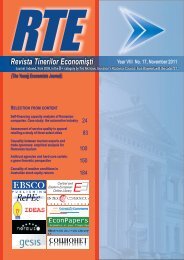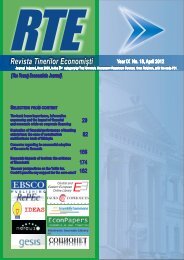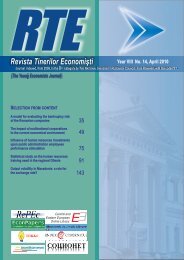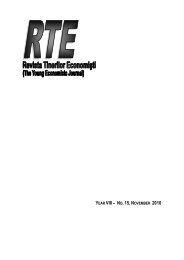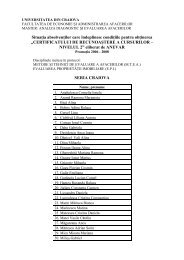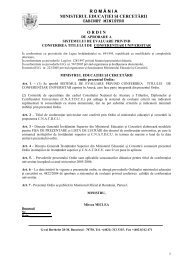Revista Tinerilor Economiºti (The Young Economists Journal)
Revista Tinerilor Economiºti (The Young Economists Journal)
Revista Tinerilor Economiºti (The Young Economists Journal)
Create successful ePaper yourself
Turn your PDF publications into a flip-book with our unique Google optimized e-Paper software.
RECENT DEVELOPMENTS IN THE EU TAXATION<br />
Assoc. Prof. Flavia Barna Ph.D<br />
West University from Timişoara<br />
Faculty of Economics and Business Administration<br />
Timişoara, Romania<br />
Assist. Petru-Ovidiu Mura Ph. D Student<br />
West University from Timişoara<br />
Faculty of Economics and Business Administration<br />
Timişoara, Romania<br />
Abstract: Anticipating the economic and social change, European Union<br />
member states have decided to restructure their aspirations and fiscal<br />
priorities. European Union fiscal policy aims to achieve important goals,<br />
such as free movement of capital, competitiveness, economic growth and<br />
employment, avoiding, at the same time, harmful tax competition between<br />
Member States. In this paper we undertook a structural - quantitative<br />
analysis of the EU taxation in order to highlight the degree to which fiscal<br />
policy objectives proposed by European decision makers are fulfilled and<br />
the existent disparities among the member states, resulting in frustration of<br />
the taxpayers.<br />
JEL classification: E62, E63.<br />
Key words: fiscal policy, labor taxation, tax burden, implicite rate of taxation, fiscal<br />
revenues structure.<br />
1. Introduction<br />
In a general sense, the fiscal policy means “the volume and source of the means<br />
of financing the public funds, the assessment methods to be used, the objectives and<br />
means of achieving them”. (Manolescu, G., 1997) Another approach argues that fiscal<br />
policy reffers to “all the measures, practical actions - based on an economic<br />
conception– the types of taxes used, their place throughout the budgetary revenues, the<br />
dynamic relations between them, as well as how to use them as leverage to stimulate<br />
economic development, solving social and political problems in the country”. (Dobrotă,<br />
N., 1997, p. 468)<br />
Seen as a support of complex decision making, fiscal policy means “all fiscal<br />
decisions taken by public decision-makers, in order to ensure the financial resources to<br />
finance public needs and achieving the socio-economic goals, while the real economy is<br />
affected by objective factors, annd their trend is not exclusively cyclical”. (Corduneanu<br />
Carmen, 1998, p. 379) Fiscal policy is determined directly related to the state’s options<br />
on taxes, meaning that it must require conscious use of the full set of fiscal tools and<br />
methods for determining the level, structure and fiscal incentives regime in the<br />
distribution of social product, so as to ensure political, economic and social objectives.<br />
(Condor I., Stancu R., 2002)<br />
9



